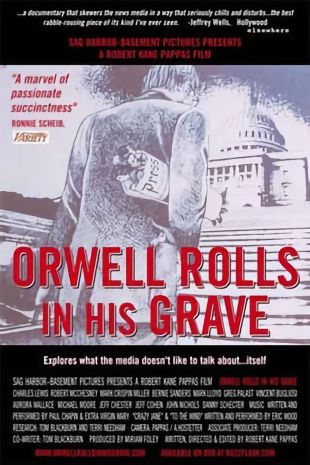
In lieu of a recent onslaught featuring political op-ed pieces that could possibly be construed as documentaries (Fahrenheit 9/11, Outfoxed, and the ilk), Orwell Rolls in His Grave takes the ideas and actions of the neo-conservative movement behind George W. Bush's administration and mass media's influence on popular culture to the farthest left one can go on the political spectrum without falling off. Director Robert Kane Pappas paints a narrative exploiting the corporate agenda of large companies and the bias of giant media conglomerates, which have shifted from being the honest communication artery between government and the people into a public relations firm on the government's tab. Unlike the two aforementioned movies, Pappas opens the documentary with a personal narrative investigating the sensationalism of Rupert Murdoch's New York Post during the '80s and continues to shape its message through sound bytes of various media professors and professionals, even featuring appearances by a fired up, passionate Michael Moore himself. While the director makes excellent points through the documentary, those who are ardent students of media studies/conservative bashing will not be presented with anything shocking or newsworthy that hasn't been presented before; however, those who haven't been following will be somewhat surprised by some of Pappas' research. The quality of the camerawork and overall production is low-fi at best and reminiscent of a high-school audiovisual club or local access program at its worst. But the heart of this documentary lies in its message, not within the medium that it is told. At times, Pappas appears to draw accurate parallels between Orwellian predictions (primarily he leans upon the well-known notion of Big Brother) and his main premise. But the melodramatic presentation and over sensationalism at times leaves a mild sour taste in one's mouth and ears, as if they just spent 90 minutes in a cab with Richard Belzer or a left-wing conspiracy theorist in a dive bar.
